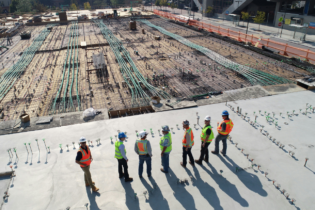Covid-19 brought numerous challenges for the global construction industry, including project delays, productivity loss, supply chain disruptions and more. These impacts have accelerated the need for digital transformation in the industry.
While some enterprises in the sector claim to be digitised, many continue to suffer collaboration issues and lack of access to all their company data. A major issue is that several systems are not integrated with one another, albeit being used simultaneously. This results in company data being dispersed across multiple sources which, in turn, makes it difficult to access data and make proactive data driven decisions, impacting efficiency and overall productivity. According to Andrew Skudder, CEO of RIB CCS, a great deal of construction data remains unstructured and unused due to outdated processes or the use of tools that are not integrated. “According to an FMI Whitepaper, 96% of all data captured goes unused in the engineering and construction industry, 90% of data generated is unstructured, and 13% of engineering and construction working hours are spent looking for project data and information. That translates to a massive waste of time and budget,” he says.The rise of new technology
The engineering and construction industry is one of the key economic sectors where robotics and automated systems have the potential to address inefficiencies and low productivity. Artificial Intelligence (AI) has been a driving force in identifying patterns in data to automate processes and uncover insights. “The engineering and construction industry is turning to technology solutions that utilise AI to solve significant and longstanding challenges. Extracting meaningful insights efficiently can only be possible if data sources are integrated and managed correctly. Better decisions can be made by businesses utilising their own accumulated data and implementing machine learning and deep learning,” says Skudder.“With the potential that AI offers, the time is now for companies in the engineering and construction industry to begin thinking about how their businesses can be transformed to establish a competitive advantage,” adds Skudder.
He emphasises that the local industry is ready to embrace platform solutions and virtual projects, saying that RIB CCS, as a software vendor, is seeing forward-thinking firms in the industry investigating implementation of practical solutions to stay connected, increase their efficiency, improve productivity, and ensure long-term competitiveness. “We believe that solutions should prioritise connecting people, data and processes, and that a single cloud platform allows for easy enterprise-wide collaboration. The continuity of data between different teams and different partners is ensured, and participants have unfettered access to accurate and consistent data. This platform should also be open and can easily be integrated with other software solutions to connect teams, unify data and standardise processes,” he explains. Adopting new software is not only about a transformative shift in technology, but also a change in the overall planning and workflows of a business. Before implementing software solutions, RIB and RIB CCS’s expert teams help clients establish a clear digital roadmap for the change management process. The aim of this is to define expectations including how the company will benefit from the digital transformation, what results are to be expected after the implementation of new technology, how the implementation process will work, and what the milestones and schedules will look like. “It is crucial to ensure that new software implementation is supported by senior management members who have the ability to allocate appropriate human resources and time to this new undertaking,” says Skudder. “After all, change management is a leadership-driven process, and senior management plays a central role in the overall success of its deployment. If senior management involvement is lacking, team behaviour and uptake will not evolve,” he concludes.





